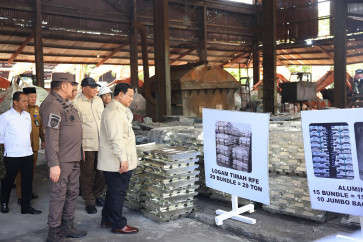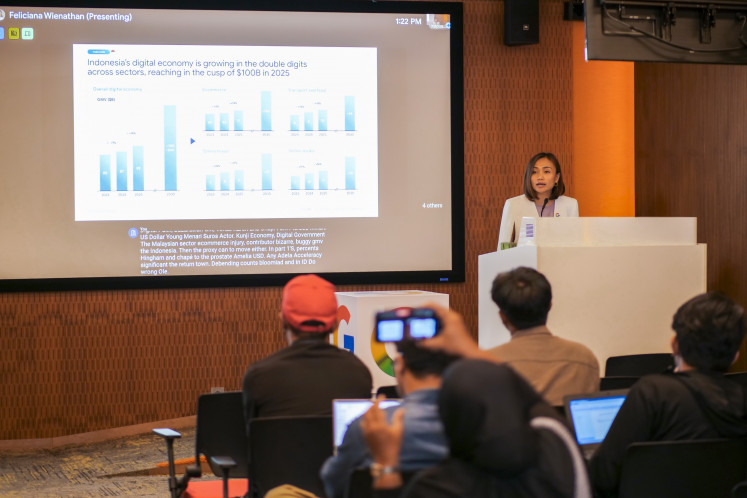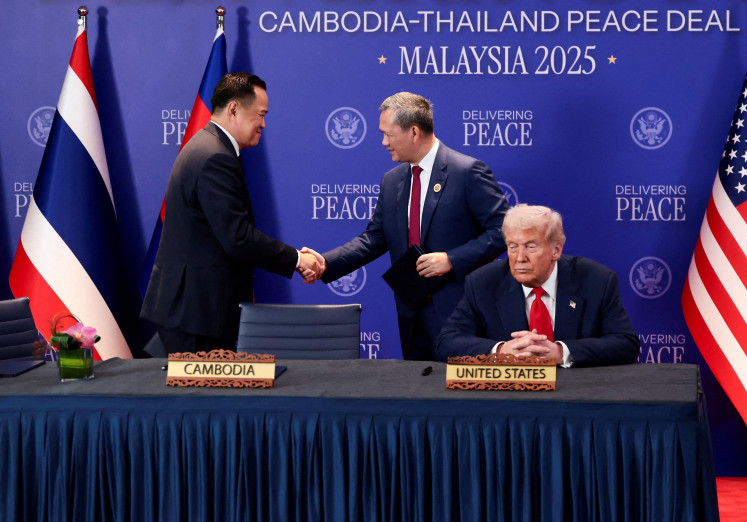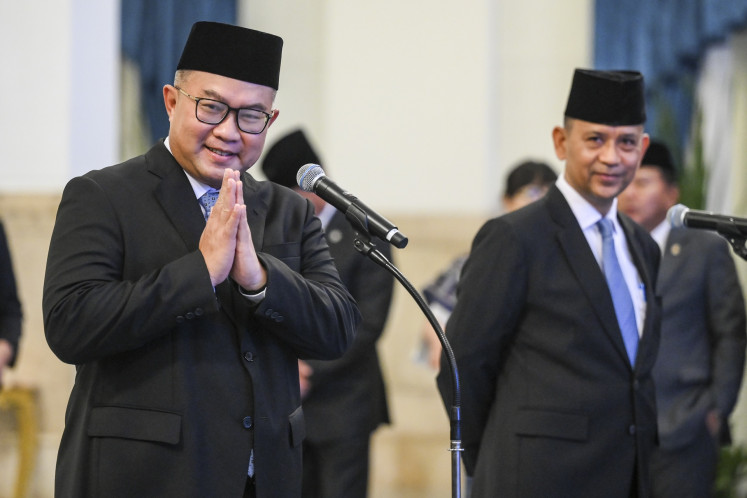Popular Reads
Top Results
Can't find what you're looking for?
View all search resultsPopular Reads
Top Results
Can't find what you're looking for?
View all search resultsBan expected to protect remaining forests
Following President Joko “Jokowi” Widodo’s signing of a presidential instruction to upgrade a moratorium on the issuance of new business permits for use of forest and peatland areas to a permanent ban, hopes are rising that Indonesia’s remaining forests can be protected
Change text size
Gift Premium Articles
to Anyone
F
ollowing President Joko “Jokowi” Widodo’s signing of a presidential instruction to upgrade a moratorium on the issuance of new business permits for use of forest and peatland areas to a permanent ban, hopes are rising that Indonesia’s remaining forests can be protected.
In mid-June, Environment and Forestry Minister Siti Nurbaya Bakar explained the country’s move to impose a moratorium on the issuance of forest and peatland clearance permits in front of an international audience during a discussion in Incheon, South Korea.
The instruction was first issued in 2011 under then-president Susilo Bambang Yudhoyono’s administration, and has been extended every two years, with the latest extension made by President Joko “Jokowi” Widodo in June 2017.
The minister said the moratorium had been effective in helping the government reform the forestry sector, including in preventing wildfires and resolving land conflicts. Siti added that the government was also planning to make the restriction permanent in the near future.
Fast forward to one and a half months later, the very same minister said the government had kept its promise by issuing a permanent ban on new permits for forest and peatland areas.
“I made sure the President signed the instruction on Aug. 5. It will upgrade the previous instruction to a permanent ban and improve primary forest and peatland management,” Siti said.
She added that the instruction would be followed by an executive order.
The restricted area, which covers around 66 million hectares, or 35 percent of the country’s total land mass, will be stipulated in an indicative map (PIPPIB). Around 52.3 million ha of the restricted area is still covered by primary forests.
The total restricted area is actually less than the 69 million ha designated in the initial 2011 moratorium, as the presidential instruction mandates the government to revise the PIPPIB every six months.
The restriction, however, will not apply to any projects related to environmental restoration, the construction of government or regional administration offices, national strategic projects, defense and security infrastructure as well as public safety support systems.
The government will also allow companies that were granted permits in forest and peatland areas prior to the moratorium in 2011 to continue their business activities.
Siti claimed the moratorium had succeeded in reducing deforestation by around 38 percent within the restricted area. She added it had helped the country fulfill its cooperation commitments with Norway under the Reducing Emissions from Deforestation and Forest Degradation (REDD+) scheme.
In February, the Indonesian and Norwegian governments agreed that the latter would pay the former for successfully reducing its carbon emissions by decreasing its deforestation rate in 2017.
According to data from the Environment and Forestry Ministry, the country saw a decline in the deforestation rate in 2017, with 480,000 ha of forest lost — a figure slightly lower than previous years. The decrease is believed to have prevented the release of about 4.8 million tons of carbon emissions into the atmosphere.
“This decrease in deforestation along with changes in forest use plans have shown forest and peatland management has improved over the years,” Siti said.
While the permanent ban has been welcomed as a solution to deforestation, environmental group Greenpeace argued the plan would be ineffective in protecting forests and peatland.
According to Greenpeace’s mapping analysis, around “1.2 million ha of forest has been lost inside moratorium areas in the seven years since it was first introduced [in 2011] at an average annual rate of 137,000 ha per year.”
“Deforestation and forest fires have continued inside moratorium areas and boundary maps get regularly redrawn to remove forest or peat areas that are of interest to plantation companies. Making it permanent [...] won’t stop forest and peatland degradation in Indonesia,” said Kiki Taufik, the head of Greenpeace Southeast Asia’s Indonesian Forests Campaign in a statement.
Further analysis conducted by the organization discovered that a total area of 4.5 million ha of forest and peatland was removed from the moratorium’s PIPPIB. New permits have also been issued for around 1.6 million ha of restricted land for oil palm plantation, pulpwood and mining companies.
Kiki argued the President should push for the full implementation of a long-awaited one-map policy and strengthen the government’s commitment to preventing deforestation and wildfires to ensure the ban was effective.
The one-map policy is stipulated in Law No. 4/2011 on geospatial information.
Previously, environmentalists also demanded the President make the moratorium permanent by upgrading it to a government regulation, which are more legally binding than presidential instructions.










